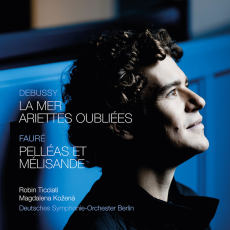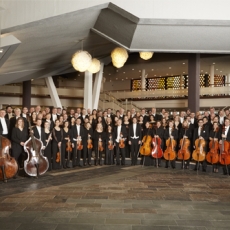Robin Ticciati & DSO - Debussy & Faure - Gramophone
The release of Robin Ticciati’s first disc with the DSO Berlin coincides with the start of his tenure as the orchestra’s music director. It marks his move into a repertory with which we don’t primarily associate him, though he conducted both La mer and Fauré’s Pelléas with the LPO at the Royal Festival Hall two years ago – a concert that divided opinion at the time – and it also includes the first recording of Brett Dean’s orchestration of Ariettes oubliées, premiered in Sydney in 2015 by Magdalena Kožena, who sings it here.
As with John Adams’s version of Le livre de Baudelaire, Dean both evokes Debussy’s sound world and goes beyond it. ‘Chevaux de bois’ owes much to Fêtes , and rustling woodwind out of Pelléas (Debussy’s, not Fauré’s) usher in the rain at the start of ‘Il pleure dans mon coeur’. When we reach ‘L’ombre des arbres’, however, penumbral brass and woodwind slowly pull us towards something altogether more Expressionist and startling. It suits Ticciati’s considered way with Debussy uncommonly well. Everything is beautifully balanced and clear. Shifts in colour and texture are carefully teased out, and the underlying sense of erotic regret is finely sustained. Kožena declaims much of the cycle in a suggestive whisper that at times verges on mannerism, though there are also moments of rapturous lyricism and exquisite, hovering pianissimos that take one’s breath away. When he turns to La mer, however, Ticciati’s attention to detail occasionally impedes the music’s organic flow. The opening of ‘De l’aube à midi sur la mer’ has a pristine clarity that impresses in itself yet falls short of genuine poetry, and the movement’s climax is reached with an air of majestic deliberation. Thereafter, however, he gets more into his stride. ‘Jeux de vagues’ has a restless beauty, and he unleashes real turmoil at the start of ‘Dialogue du vent et de la mer’. The playing is exemplary – the woodwind are particularly outstanding – though the orchestral and recorded sound are very bright: this seascape glares a bit, throughout.
Few will have qualms about the Fauré, though. The Pénélope Prelude is wonderfully controlled in its progression from uneasy calm to agitation and back. Ticciati’s Pelléas is darker in tone than many, and beautiful in its discreet sensuality: the bittersweet shifts of mood in the ‘Sicilienne’ are immaculately judged. It’s an uneven disc overall, though the best of it promises much from Ticciati’s collaboration with the DSO, and is very fine indeed.



